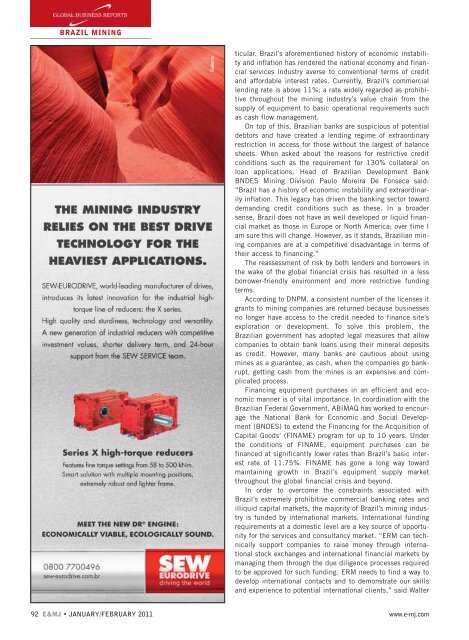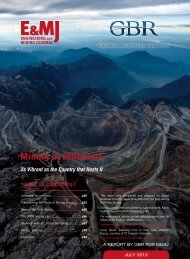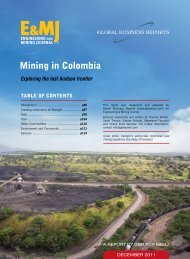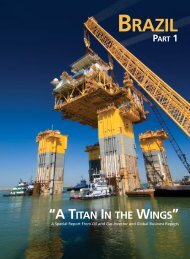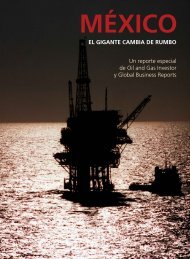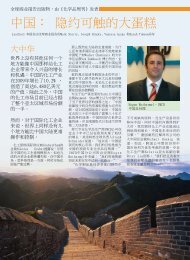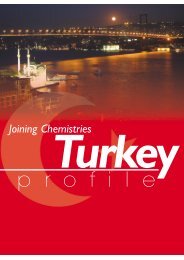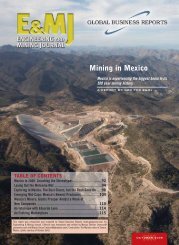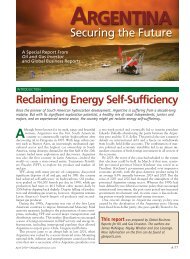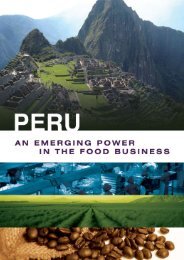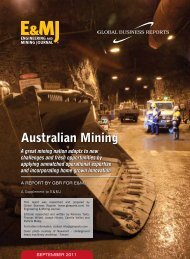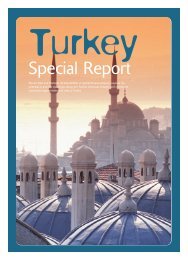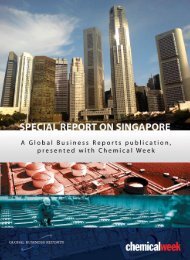Brazil Mining 2011 - GBR
Brazil Mining 2011 - GBR
Brazil Mining 2011 - GBR
You also want an ePaper? Increase the reach of your titles
YUMPU automatically turns print PDFs into web optimized ePapers that Google loves.
BRAZIL MINING<br />
ticular. <strong>Brazil</strong>’s aforementioned history of economic instability<br />
and inflation has rendered the national economy and financial<br />
services industry averse to conventional terms of credit<br />
and affordable interest rates. Currently, <strong>Brazil</strong>’s commercial<br />
lending rate is above 11%; a rate widely regarded as prohibitive<br />
throughout the mining industry’s value chain from the<br />
supply of equipment to basic operational requirements such<br />
as cash flow management.<br />
On top of this, <strong>Brazil</strong>ian banks are suspicious of potential<br />
debtors and have created a lending regime of extraordinary<br />
restriction in access for those without the largest of balance<br />
sheets. When asked about the reasons for restrictive credit<br />
conditions such as the requirement for 130% collateral on<br />
loan applications, Head of <strong>Brazil</strong>ian Development Bank<br />
BNDES <strong>Mining</strong> Division Paulo Moreira De Fonseca said:<br />
“<strong>Brazil</strong> has a history of economic instability and extraordinarily<br />
inflation. This legacy has driven the banking sector toward<br />
demanding credit conditions such as these. In a broader<br />
sense, <strong>Brazil</strong> does not have as well developed or liquid financial<br />
market as those in Europe or North America; over time I<br />
am sure this will change. However, as it stands, <strong>Brazil</strong>ian mining<br />
companies are at a competitive disadvantage in terms of<br />
their access to financing.”<br />
The reassessment of risk by both lenders and borrowers in<br />
the wake of the global financial crisis has resulted in a less<br />
borrower-friendly environment and more restrictive funding<br />
terms.<br />
According to DNPM, a consistent number of the licenses it<br />
grants to mining companies are returned because businesses<br />
no longer have access to the credit needed to finance site’s<br />
exploration or development. To solve this problem, the<br />
<strong>Brazil</strong>ian government has adopted legal measures that allow<br />
companies to obtain bank loans using their mineral deposits<br />
as credit. However, many banks are cautious about using<br />
mines as a guarantee, as cash, when the companies go bankrupt,<br />
getting cash from the mines is an expensive and complicated<br />
process.<br />
Financing equipment purchases in an efficient and economic<br />
manner is of vital importance. In coordination with the<br />
<strong>Brazil</strong>ian Federal Government, ABIMAQ has worked to encourage<br />
the National Bank for Economic and Social Development<br />
(BNDES) to extend the Financing for the Acquisition of<br />
Capital Goods’ (FINAME) program for up to 10 years. Under<br />
the conditions of FINAME, equipment purchases can be<br />
financed at significantly lower rates than <strong>Brazil</strong>’s basic interest<br />
rate of 11.75%. FINAME has gone a long way toward<br />
maintaining growth in <strong>Brazil</strong>’s equipment supply market<br />
throughout the global financial crisis and beyond.<br />
In order to overcome the constraints associated with<br />
<strong>Brazil</strong>’s extremely prohibitive commercial banking rates and<br />
illiquid capital markets, the majority of <strong>Brazil</strong>’s mining industry<br />
is funded by international markets. International funding<br />
requirements at a domestic level are a key source of opportunity<br />
for the services and consultancy market. “ERM can technically<br />
support companies to raise money through international<br />
stock exchanges and international financial markets by<br />
managing them through the due diligence processes required<br />
to be approved for such funding. ERM needs to find a way to<br />
develop international contacts and to demonstrate our skills<br />
and experience to potential international clients,” said Walter<br />
92 E&MJ • JANUARY/FEBRUARY <strong>2011</strong> www.e-mj.com


